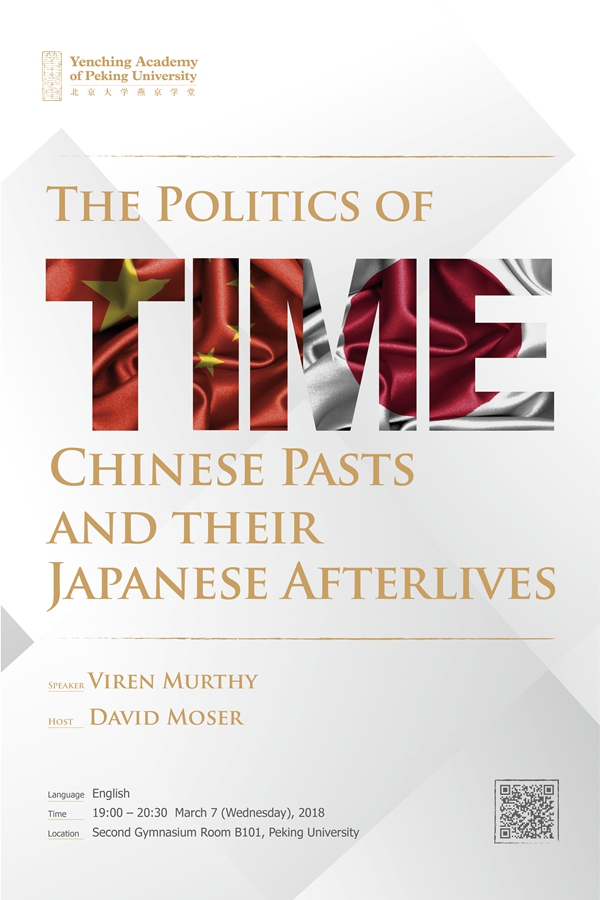
Lecture Information:
Speaker: Viren Murthy
Theme: The Politics of Time: Chinese Pasts and Their Japanese Afterlives
Date: March 7 (Wednesday), 2018
Time:19:00 – 20:30
Location: SecondGymnasium Room B101, Peking University
Language: English
Abstract:Scholarshave long highlighted how the concepts “past” and “future” must be placed in historical context, and this certainly applies with respect to Chinese and Japanese conceptions of time. However, in the cases of China and Japan, the transformations of conceptions of the past have particular political implications and are connected to different ways of imagining the world. Diverse pasts imply different ways of situating oneself in the world. China’s past has been an important issue for both Chinese and Japanese political thought and Japanese visions of the Chinese past changed as they slowly began to decenter China. This presentation traverses a number of different conceptions of the past in both places in order to ask about the nature of time and politics. We will inquire into the Confucian ideal of the ancient past as ideal, the past as part of a genealogy of a divine Japanese emperor, and the past as part of an evolutionary process. These the past are not merely temporal, but spatial or geographical and each will invoke the image of China differently. Specifically, for a large part of pre-modern Chinese history, China was assumed to be the center of “all-under-heaven” (tianxia), a specific politico-geographical imaginary and the ancient institutions of China were considered the foundation of an ideal polity. This idea of China as both center and idea was not limited to China, during various periods, political elites in Korea and Japan also invoked the Chinese past as an ideal. However, during the modern period, as both China and Japan enter the global capitalist system of nation-states, Chinese and Japanese intellectuals both begin to decenter China. This adherence to evolutionary time and de-centering of China, by extension Asia, is significant because it represents the advent of a new dominant political ideologies associated with modernity and capitalism. While not all intellectuals in China and Japan were happy with ideologies associated with the West, they would now have to rethink earlier political theories in relation to modernity, capitalism and liberal ideas such as freedom and equality.
Speaker:

Viren Murthy teaches transnational Asian History and researches Chinese and Japanese intellectual history in the Department of History at the University of Wisconsin-Madison. During the academic years 2016-2018, he is a fellow at the Berggruen Institute for Philosophy and Culture. He is the author of The Political Philosophy of Zhang Taiyan: The Resistance of Consciousness (Brill, 2011) and co-editor with Axel Schneider of The Challenge of Linear Time: Nationhood and the Politics of History in East Asia (Brill,2013), co-editor with Prasenjit Duara and Andrew Sartori of A Companion to Global Historical Thought, (Blackwell, 2014), co-editor with Joyce Liu of East Asian Marxisms, Routledge, 2017 and co-editor with Fabian Schäfer and Max Ward of Confronting Capital: Rethinking the Kyoto School of Philosophy, Brill, 2017. He has published articles in Modern Intellectual History, Modern China, Frontiers of History in China and Positions: Asia Critique and is currently working on a project tentatively entitled: Pan-Asianism and the Conundrums of Post-colonial Modernity.